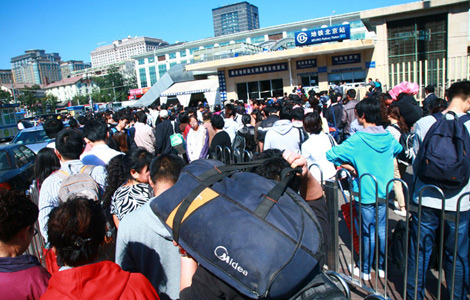Monetary tightening takes toll on China's SMEs
Updated: 2011-09-30 21:13
(Xinhua)
|
|||||||||||
WENZHOU - Some entrepreneurs have disappeared and others have jumped off buildings almost every week since April in Eastern China's Zhejiang province.
At least 80 cash-strapped businesspeople in Wenzhou, China's entrepreneurial capital, have gone into hiding or declared bankruptcy to invalidate more than 10 billion yuan ($1.6 billion) in debt owed to individual creditors pooled from the informal lending market, according to a Xinhua investigation.
Just last week, two local entrepreneurs in Wenzhou killed themselves by jumping from buildings and another broke his leg in a similar suicide attempt.
The tragedies in Wenzhou are extreme cases of small and mid-sized private companies struggling to survive a liquidity crunch amid the country's macro control policies which have been set to cool inflation and reign in the runaway property market.
To curb soaring inflation, the People's Bank of China (PBOC), the country's central bank, has raised banks' reserve requirement ratio six times this year and hiked interest rates three times in a bid to check excessive lending. Both actions have made it very difficult for private firms to borrow from banks.
China's benchmark interest rate of one-year deposits currently stands at 3.5 percent and banks have to set aside 21 percent of their deposits as reserves, mopping up about 2.1 trillion yuan of liquidity otherwise available for lending.
The informal lending market between companies and individuals, which operates outside the banking industry, became a last resort for many private entrepreneurs facing a cash squeeze.
"If you look at the interest rate in the informal lending market, you will see how crazy the situation is," said Gao Jie, a department manager of the China Financial Union Investment Management Co., Ltd. (CFUIM).
"When borrowing from banks almost dries up this year, the monthly lending rate in the underground lending market could shoot up to as high as 5 percent, equivalent to 60 percent annually," Gao said.
Economists say local residents in Wenzhou prefer to lend on the informal market rather than to banks because of the huge gap between borrowing the rates of banks and the informal lending market.
According to statistics from the PBOC's Wenzhou branch, the composite annual interest rate in the city's informal lending market hit a record 25.09 percent by the end of August, compared with the banking sector's benchmark one-year lending rate of 6.56 percent.
As a result, businesses involved in the informal lending market ballooned in Wenzhou, a city of about 9 million people. Currently, there are 186 guarantee firms, 1,088 investment companies, 431 consignment stores and 48 pawnshops in the city, data from local government departments showed.
Outstanding high-yield loans issued in the informal lending market currently total 110 billion yuan in Wenzhou, about one-fifth of the loans made by the city's banks, according to data from the PBOC's Wenzhou branch.
Lian Ping, the chief economist with Bank of Communications, said it is easy for those dealing with the informal lending market to fall into a vicious circle by taking on new debts to repay old ones, considering the system's similarity to a Ponzi scheme.
Lian said the equilibrium of such a system can only be maintained on the condition that people's expectations for rising interest rates continue unremittingly.
"If there is no new funding to support such expectations, the system will collapse and creditors will suffer huge losses," Lian said.
Meanwhile, an increasing amount of lending via the informal market has been reported outside Zhejiang province. Informal lending markets have grown in east China's Fujian and Jiangsu provinces, as well as in North China's Shanxi province, Liaoning province and Inner Mongolia autonomous region.
"For small firms, the primary concern is not the [lending] prices, but the chance to get the loans from informal lending markets even though the interest rates are very high," said Tian Dagang, general manager of Shenyang Huaqing Machine Tool Facilities Co., Ltd. in northeast China's Liaoning Province.
Tian was desperate for an emergency loan of 580,000 yuan to cover turnover last year. After every bank he applied to rejected his loan application, he had to borrow from individuals and repay 700,000 yuan in principal and interest three months later.
Many small and mid-sized businesses in Guangdong province, an economic powerhouse in southern China, are in the same boat as Tian.
A survey by PBOC's Guangzhou branch in April found that about three in every four small and mid-sized businesses in 16 cities in the province said it was more difficult to obtain loans this year than in 2010. These companies were short of 4.72 billion yuan in cash in the first quarter.
In Wenzhou, the epicenter of the informal lending market, one-fifth of the city's 360,000 small and mid-sized businesses have stopped operating due to cash shortages, according to the city's council for small and mid-sized enterprises.
Zhou Dewen, president of the city's small and mid-sized enterprises council, said policymakers should be careful not to let monetary tightening overwhelm the country's small firms.
"If this trend continues, about 40 percent of small and mid-sized enterprises will be forced to shut down their businesses after the Spring Festival next year," Zhou warned.
Half of Wenzhou's small and mid-sized enterprises said the current interest rate in the informal lending market was the highest level they can handle, according to a survey by the city government's finance office.
Small and mid-sized enterprises face greater difficulties this year than during the global financial crisis in 2009, according to the survey.
"For many private companies, borrowing from the informal market at interest rates as high as 100 percent means certain suicide, as most of their annual profit margin is below 10 percent," said Guo Tianyong, director of the China Banking Research Center with the Central University of Finance and Economics.
Guo warned that the rupture in small and mid-sized enterprises' capital chain could spread, and called for more attention from regulators to stop the situation from worsening.
"Otherwise, more funds will flee the real economy and threaten China's economic growth as a whole," he added.
- China's Tiangong-1 space module blasts off
- Social network sites pose problems
- Monetary tightening takes toll on SMEs
- City: No babies seized for adoption
- Recovery next year for world stocks
- Typhoon Nesat lands in South China
- Govt bodies flunk 'transparency' test
- China launches Tiangong-1 space module
Hot Topics
Libya conflict, Gaddafi, Oil spill, Palace Museum scandal, Inflation, Japan's new PM, Trapped miners, Mooncake tax, Weekly photos, Hurricane Irene
Editor's Picks

|

|

|

|

|

|







